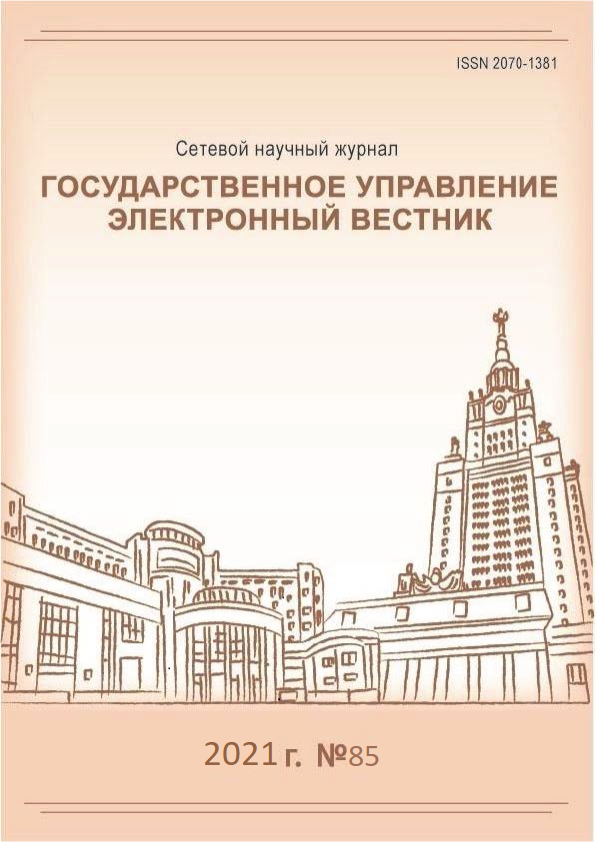Sex and Age Peculiarities in the Structure of Management Role
Keywords:
Management, management team, management roles, formal roles, informal roles, role preferences, gender, ageAbstract
Based on empirical material, the article examines the features of gender and age influence on the formation of managerial roles structure among managers as members of the management team. The article summarizes the results of studies that since 2014 have been carried out at the Faculty of Assessment and Development of Management Personnel of the Higher School of Economics, RANEPA under the President of the Russian Federation, under the guidance of DSc (Psychology), Professor Yu.V. Sinyagin. The relevance of the study is determined by the social requirements for improving management processes, the importance of the command principle in making and implementing managerial decisions and the need in this regard to study more deeply the peculiarities of managers’ choice of certain managerial roles and identify the features of gender and age influence on the structure of these roles. The material for the analysis was obtained at the faculty in 2014–2019 and contain results of personal and professional diagnostics of managers — representatives of the federal state civil service, state service of the constituent entities of the Russian Federation, as well as heads of budgetary institutions of Russia (n = 6602). The biographical questions of the “Assessment of management potential” questionnaire were used as diagnostic tools as well as joint distribution method, Pearson χ2 test. As a result of empirical data analysis, it was found that there is a clear age dynamics and gender characteristics in the distribution of formal managerial roles. Significant differences were revealed between the subgroups, distinguished by gender and age, in the relationship between the performed formal managerial roles and preferences in the field of informal managerial roles. It is shown that in all the subgroups identified, the most characteristic informal managerial role in the respondents’ assessments is the role of the organizer, and the least characteristic role is the role of the personnel officer, staff officer, controller and innovator. For each of the subgroups identified, the “role profiles” of managers occupying different positions in the management hierarchy are described. It has been established which formal managerial roles are more often performed by respondents of different sex and age, who prefer to play certain informal managerial roles. The gender and age specificity of these relationships was revealed.
References
Асеев В.Г., Синягин Ю.В. Опросник оценки ролевой позиции в управленческой команде // Методики диагностики управленческого персонала и латентной структуры организации. М.: Изд-во РАГС, 2009. С. 44–45.
Багаева К.Р. Ключевые факторы эффективности функционирования управленческой команды // Экономика и управление в XXI веке: тенденции развития. 2013. № 9. С. 113–120.
Баркова Ю.К., Клычникова К.А., Селезнева Е.В., Чирковская Е.Г. Взаимосвязь образовательной и управленческой успешности руководителей // Наука и мир. 2019. № 11(75). Т. 2. С. 65–71.
Белбин Р.М. Типы ролей в командах менеджеров. М.: HIPPO, 2003.
Елисеенко А.С., Зверев Д.А. Технология симулятивного тренинга для развития системного мышления и развития управленческих команд // Организационная психология. 2013. Т. 3. № 3. С. 97–112.
Казаков В.В. Руководитель «среднего звена» в управлении организацией: теоретикосоциологический подход к определению понятия // Социология власти. 2007. № 1. С. 105–112.
Лебедева А.В., Селезнева Е.В., Чирковская Е.Г. Взаимосвязь фактов биографии и профиля управленческой готовности // Вестник Московского государственного областного университета. Серия: Психологические науки. 2019. № 4. С. 49–59. DOI: 10.18384/2310-7235-2019-4-49-59.
Орехова С.В., Кудин Л.Ш. Результативность управления и роль генерального директора компании // Известия Саратовского университета. Новая серия. Серия: Экономика. Управление. Право. 2020. Т. 20. № 2. С. 158–167. DOI: https://doi.org/10.18500/1994-2540-2020-20-2-158-167.
Осмоловская А.С. Формирование и развитие управленческих команд // Бизнесобразование в экономике знаний. 2019. № 1. С. 57–62.
Синягин Ю.В. Опросник оценки управленческого потенциала в комплексной личностнопрофессиональной диагностике. М.: Издательский дом «Дело» РАНХиГС, 2020.
Синягин Ю.В. Особенности представлений руководителей об эффективной управленческой команде и способах ее формирования // Живая психология. 2019а. Т. 6. № 1. С. 25–45.
Синягин Ю.В. Трехкомпонентная модель управленческой готовности // Живая психология. 2017. Т. 4. № 2. С. 101–108. DOI: 10.18334/lp.4.2.38381.
Синягин Ю.В. Факторы, условия и биографические предикторы успешной управленческой карьеры в системе государственной гражданской службы // Государственная служба. 2019б. № 4. С. 6–21. DOI: 10.22394/2070-8378-2019-21-4-6-21.
Синягин Ю.В., Селезнева Е.В. Взаимосвязь эффективности деятельности руководителей на государственной гражданской службе и их личностно-профессионального потенциала // Вопросы управления. 2016. № 4(22). С. 98–105.
Тарханова Е.С. Исследование гендерных различий в управленческой сфере // Наука. Общество. Государство: Электронный научный журнал. 2017. Т. 5. № 2(18). URL:https://esj.pnzgu.ru/files/esj.pnzgu.ru/tarkhanova_es_17_2_23.pdf.
Хрущев К.А. Формирование ролевой структуры команды проекта // Роль гуманитарных и социально-экономических наук в развитии общества: сборник научных трудов по материалам Международной научно-практической конференции 28 декабря 2018 г.: в 3-х ч.; Часть II. Белгород: ООО Агентство перспективных научных исследований (АПНИ), 2019. С. 145–152.
Aritzeta A., Swailes St., Senior B. Belbin's Team Role Model: Development, Validity and Applications for Team Building // Journal of Management Studies. 2007. Vol. 44. No. 1. P. 96–118. DOI: https://doi.org/10.1111/j.1467-6486.2007.00666.x.
Benne K.D., Sheats P. Functional Roles of Group Members //Journal of Social Issues. 1948. Vol. 4. Is. 2. P. 41–49. DOI: https://doi.org/10.1111/j.1540-4560.1948.tb01783.x
Mumford T.V., Van Iddekinge C.H., Morgeson F.P., Campion M.A. The Team Role Test: Development and Validation of a Team Role Knowledge Situational Judgment Test // Journal of Applied Psychology. 2008. Vol. 93(2). P. 250–267. DOI: https://doi.org/10.1037/0021-9010.93.2.250.
Stewart G.L., Fulmer I.S., Barrick M.R. An Exploration of Member Roles as a Multilevel Linking Mechanism for Individual Traits and Team Outcomes // Personnel Psychology. 2005. Vol. 58. No. 2. P. 343–365. DOI: https://doi.org/10.1111/j.1744-6570.2005.00480.x.
Stewart Gr.L., Barrick M.R. Team Structure and Performance: Assessing The Mediating Role of Intrateam Process and the Moderating Role of Task Type // Academy of Management Journal. 2000. Vol. 43. No. 2. P. 135–148. DOI: https://doi.org/10.5465/1556372.

